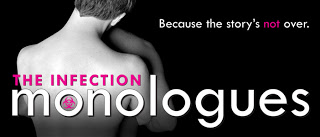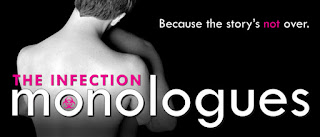The Infection Monologues, a stark and blunt play about the difficulties of living with HIV, is an infectious, honest and powerful show. Set amongst a barely decorated set, the story of 5 men living with HIV is immensely moving. This one night only production was produced by the Gay City Health project, in an attempt to raise awareness on the way our society understands HIV infections among gay men. In addition to subverting stereotypes, The Infection Monologues realistically depicts the stigma of living with HIV.
Originally written in 2005 by Eric Rofes and Alex Garner, this rendition of The Infection Monologues expands the narratives of men living with HIV nearly thirty years after the original AIDS epidemic. Interestingly enough, this particular performance was expanded and updated to reflect the unique experiences of living with HIV in Seattle. The plot is fairly simple; a group of men discuss how they possibly contracted the virus and the consequences of becoming infected. The show presents a holistic perspective of living with HIV; each of the characters provides a different perspective of what it is like to live with such a defining virus.
To say this production was well acted is an understatement. For a good portion of the play, I had difficulty remembering that I was watching fictitious accounts of living with HIV. Most of the actors were so convincing, and the script was so realistic, that I felt like I was watching these men bravely recount their pasts. At one point, I was actually moved to tears as one of the characters spoke about his anger surround the public stigma of HIV. His anger indicated that post-diagnosis, most people stopped seeing him as a person and started treating him like a statistic.
One of the most powerful statements about becoming infected came early in the play. One character said, “It has only been moments, but I knew that life with HIV was already nothing like I had envisioned”. This statement is so powerful, yet so telling. For those of us are negative, we can never truly understand what it emotionally feels like to become infected. To feel like your entire life has been irrevocably altered. Granted, modern medicine has made living with HIV much more tolerable, but the bleak reality is that contracting HIV is irreversible. It is not something that can be undone. As much as we can try to empathize with the men who are positive, we can never really know what it’s like to be them.
The reactions of the characters upon learning they were infected were varied. Some felt anger, others felt shame, others looked for someone else to blame and one character even expressed a sense of relief. For the most part, even though I am negative, I felt like I could relate to the reactions, thoughts and feelings of most of the characters. Even though I haven’t had to personally live through what these characters have experiences, I felt like I would most likely react the same way. At one point a shocking statistic came into play. The script suggested that up to 40% of gay men in Seattle are currently living with HIV. Although I question the validity of that number, my reaction upon hearing it was palpable. How many of us really, truly know that our sexual partners are negative? Most likely, great numbers of gay men take the promises of their sexual partners at face value. Undoubtedly, a great number of gay men choose to believe the people they have sex with, often without even asking for proof of a positive or negative status. Undoubtedly sex is complicated. Many people do not simply think about the science or statics of becoming infected with HIV. Any man is capable of convincing himself that having unprotected sex is worth the risk. Safety is nothing more than an illusion when emotions come into play.
For the most part, I appreciated that The Infection Monologues depicted the brutal realities of HIV. There was also a great deal of subverting stereotypes that took place. Despite the relatable brilliance of this piece, one particular perspective left me unnerved. One of the characters, as portrayed by creator Alex Garner, promoted an extremely controversial perspective. Assuming there is a great deal of truth behind the character’s opinion, I was surprised to hear about the relief after diagnosis. Garner’s character, Victor, actually indicated that he was relieved to be diagnosed with HIV. He was happy that his sexuality no longer has the threat of infection looming over it. Victor empathically claimed that post-diagnosis, he stopped using condoms and was able to experience the full pleasure of sexual intercourse. More than that, this HIV positive character expressed his belief that the greatest threat to the prevention of infection is a healthy HIV positive man. While it was important for The Infection Monologues to present a variety of opinions, this particular perspective seemed to glamorize the disease. It is undoubtedly important that society changes its perspective of living with HIV; the reality, however, is that HIV is still a dangerous virus. It was hard for me to accept this particular perspective as anything other than irresponsible.
The current generation of young gay men grew up knowing about HIV for their entire lives. While the virus is more manageable today, it is still not curable. It is important to sustain a truthful discussion about the disease. Overall, The Infection Monologues was powerful, timely and well acted piece that undoubtedly benefits the gay community, and society as a whole. We must always remember that there are real people behind this disease and that sexuality is never a rigidly defined, black and white concept.
– Chris Heide














Many positive men find it a relief to test positive. There have been plenty of people who have thought about why this might be. It's hardly "irresponsible" to portray a valid and common emotive response to the epidemic. That's the way it is, Chris.